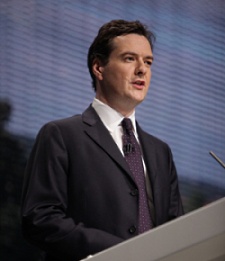Government unveils £100m for urban broadband

The government is to invest £100m in creating up to 10 'super-connected cities' in the UK, which will include the four capitals.

The chancellor George Osborne has announced an investment of £100m to create 10 'super-connected cities' in the UK. Photo credit: Conservative Party
Chancellor George Osborne announced the move in his Autumn Statement (PDF) on Tuesday. The urban broadband cash will form part of a £5bn fund the government is setting aside for capital projects described in a new National Infrastructure Plan (PDF).
"We will help bring world-leading super-fast broadband and Wi-Fi to 10 cities, including the capitals of all four nations," Osborne told the House of Commons.
Apart from Edinburgh, London, Belfast and Cardiff, up to six other
cities will get to share in the £100m pot. These cities will be chosen
in a UK-wide competition, and all those chosen will get broadband in the speed ranges of 80-100Mbps.
The rationale behind the broadband plan, the Treasury said, is to support economic growth by focusing on the needs of small and medium-sized enterprises (SMEs) and "strategic employment zones".
BT welcomed the news, saying in a statement that it was "a positive initiative that will help ensure our major cities have the best available super-fast broadband".
"BT is already upgrading large parts of these cities under its commercial rollout plan and these funds could help us go further. We look forward to working closely with the selected cities to see what can be achieved," the company said.
Graphene funding
The National Infrastructure Plan also includes £50m for a National Graphene Institute, although the government had already announced that funding in October. Graphene is attracting increasing attention as a new material capable of advanced uses in electronics and industry, and UK researchers have been at the forefront of its development.
£75m will also go to funding SMEs' research and development and to creating a new Open Data Institute, to be established under the leadership of Sir Tim Berners-Lee and Nigel Shadbolt.
The graphene money will come in the 2012-13 fiscal year, as will the first £20m of the urban broadband fund. The biggest chunk of the broadband money — £60m — will be parcelled out in 2013-14, with a further £20m the next year. The R&D and open data funding will come in three annual lots of £25m.
The £150m in funding for the extension of mobile coverage to 99 percent of the UK — announced almost two months ago but included in the National Infrastructure Plan shown off on Tuesday — will involve £30m in the 2012-13 fiscal year and £60m in each of the next two years.
The government also said on Tuesday that it intended to see the rollout of smart utility meters across the UK completed by 2019. It noted that "development of the communications and data infrastructure required to support smart meters is expected to commence by 2014", which is somewhat behind the original kick-off date of 2012.
Get the latest technology news and analysis, blogs and reviewsdelivered directly to your inbox with ="http:>ZDNet UK'snewsletters.